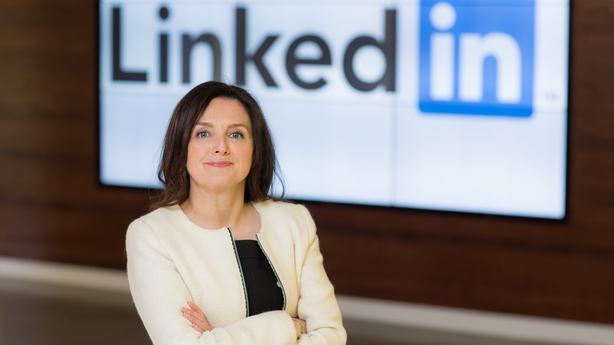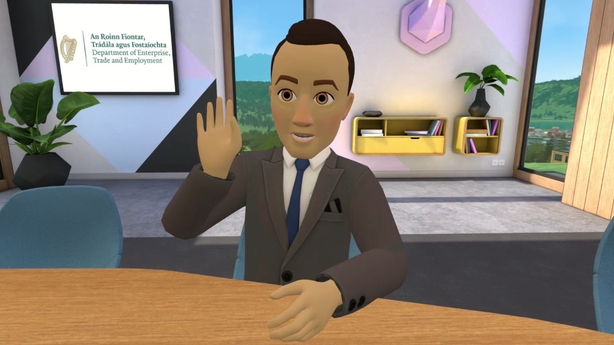[ad_1]
Free pizza, an ice cream van in the car park and ‘bring your dog to work’ days.
Just some of the steps being taken by employers to entice remote workers back into the office, but many of them are choosing to stay at home.
Remote working organisation ‘Grow Remote’ advises companies and communities on remote working policies and says some businesses are really struggling to get staff to return to the workplace.
“Bring your dog to work days, ice cream trucks, free pizza – whatever their imaginations can muster up they are trying, but people just aren’t coming back into the office,” said Grow Remote co-founder Tracy Keogh.
The recent resurgence of Covid-19 has added to the uncertainty for employers.
“They are confused and don’t know if people aren’t coming into the office because of Covid or because the company is doing something wrong,” Ms Keogh said.
Evolution of remote working
‘Grow Remote’ believes there are three stages for companies when it comes to the evolution of remote working.
The first was Covid, which forced businesses into facilitating working from home. The second is compromise, which is the stage we are at now.
“Companies are offering half-in-half-out hybrid models but with no big cultural transformation backing that up,” she said.
“We think there will be a third horizon in the next couple of months where companies are forced to make a big decision.
“They will swing one way or the other – all in, back in the office or they’ll decide to embrace remote working. That will take a capital investment and dedicated change transformation projects.”

There is still reluctance and resistance at a cultural level within many organisations.
“There are significant risks involved if you are changing your whole operating model such as concerns around productivity.
“Some organisations saw spikes in productivity during Covid but weren’t sure if that was linked to the pandemic – people coming together during a time of crisis,” she said.
Office space
Another source of concern for companies is office space, particularly if they are locked into a lease for premises they may no longer need.
If companies are drawing up remote working policies, it doesn’t seem to have dampened the demand for office space.
Figures released on Thursday showed that the numbers of leasing transactions in Dublin have returned to pre-pandemic levels.
According to research by real estate management company JLL, the second quarter of 2022 saw 60 transactions covering the leasing of more than 500,000 sq ft of Dublin office space.
It was the most active quarter in the sector since the end of 2019, before Covid-19 hit.
The tech industry accounted for 31% of space leased across five deals, with banking and finance the second largest industry, with 30% of the market across 14 deals.
One-third of leases were located in the suburbs in Sandyford and Citywest.
“New space will play a more significant role in the market’s leasing activity, with occupiers meeting environmental, social and corporate governance criteria,” said Niall Gargan, Head of Research at JLL.
Job vacancies
While companies may be continuing to rent office space, they are also continuing to advertise remote working opportunities.
On Monday, IDA Ireland in partnership with Microsoft and LinkedIn, published its latest Labour Market Pulse.
It showed that almost one in five Irish job postings on LinkedIn in April offered candidates the ability to work from home.
It meant that Ireland had more availability of remote roles across seven markets monitored by LinkedIn with a clear lead over other countries such as the UK, United Arab Emirates and Germany.
“Our data shows that hybrid working continues to be a significant factor in attracting talent to organisations, which in turn has led to an evolution in how we collaborate, and a natural uptake in the adoption of digital skills and tools,” said Sharon McCooey, Head of LinkedIn Ireland.

“This evolution in skills across the Irish workforce is not simply being driven by the pandemic, as a range of other factors like Brexit and increased regulation has seen many professionals upskill in areas like customs regulation, Know Your Customer and GDPR,” she added.
‘Grow Remote’ says that while there are thousands of remote working jobs available many of them are with companies that were offering remote working long before the pandemic and have established systems in place.
“The others are still trying to work out their remote working policies,” said Grow Remote co-founder Tracy Keogh.
One thing that is making that transition easier is advances in technology.
Technology
“At the start of Covid, products weren’t specifically developed for remote working because the market wasn’t big enough but now the technology is so much better,” said Ms Keogh.
“Just look at Zoom and the security issues they had at the start of Covid versus now,” she added.
On Thursday, Tánaiste Leo Varadkar visited the new Dublin campus of Meta, Facebook’s parent company.
He was there to experience a demonstration of the company’s ‘Horizon Workroom’, a virtual reality meeting space designed to facilitate remote working.

“It enables teams to meet in the same virtual space to brainstorm or whiteboard an idea, work on a document, hear updates from the team and simply have better conversations that flow more naturally,” according to Meta.
Mr Varadkar donned a pair of virtual reality goggles and entered the ‘metaverse’. Appearing as a cartoon-like avatar, he sat in a virtual meeting room, chatted with colleagues and high-fived a fellow Workroom participant.
After the demonstration, the Tánaiste described it as a glimpse into the future.
“Remote, home and hybrid working are here to stay,” he said.
“We all saw how technology helped us work, buy the things we needed, and keep in touch with our friends and family when Covid was at its worst.”
We need your consent to load this rte-player contentWe use rte-player to manage extra content that can set cookies on your device and collect data about your activity. Please review their details and accept them to load the content.Manage Preferences
“I’m excited about the potential for further advances to make our online experience even better,” Mr Varadkar added.
Perhaps state-of-the-art virtual offices will be the answer for companies, at a time when not even ice cream vans and free pizza can get people back into the traditional workplace.
[ad_2]
Source link




More Stories
How Finance Companies Are Adapting to New Technologies
What You Need to Know About Top Finance Companies
How Finance Companies Help Drive Economic Growth